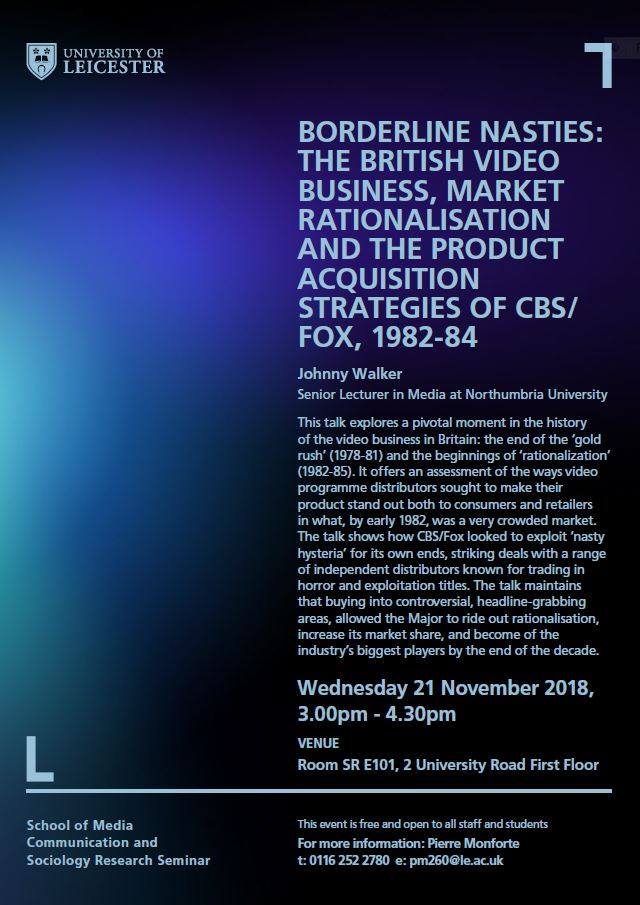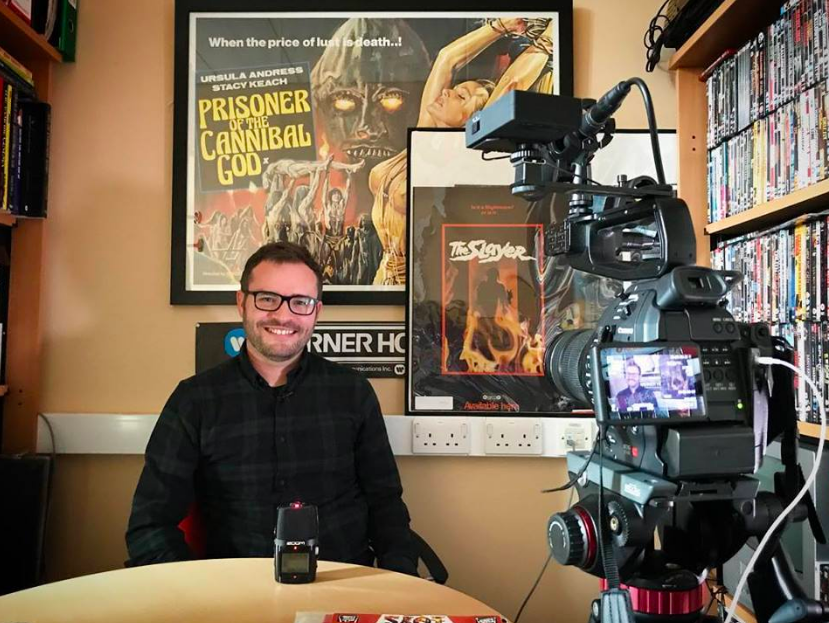|
On Wednesday 29 September, I was a participant in a panel discussion about the life and work of the late Professor Peter Hutchings, to celebrate the publication of the second edition of Peter's first book, Hammer and Beyond: The British Horror Film, originally published by Manchester University Press in 1993. Chaired by Kate Egan (Northumbria), the panel also included Russ Hunter (Northumbria), Leon Hunt (Brunel), Adam Lowenstein (Pittsburgh) and Alison Peirse (Leeds). A recording of the event has been made available over on the website for the Horror Studies Special Interest Group of the British Association of Film, Television and Screen Studies, and can also be accessed below. The new edition of Hammer and Beyond, edited by me and with an afterword by Russ Hunter, can ordered direct from the publisher here. Enter discount code 'HAMMER21' to receive 40% off. This offer ends on 29 October.
0 Comments
At the annual meeting of the Horror Studies Scholarly Interest Group held as part of the Society for Cinema and Media Studies conference in Seattle, I was one of two new co-chairs elected to replace outgoing founding co-chairs Allison Whitney (Texas Tech) and Murray Leeder (Calgary).
I am happy to report that I'll be joining the newly elected Ashley R. Smith (Northwestern), along with graduate student representative Sonia Lupher (Pittsburgh) and founding co-chair Adam Hart (Pittsburgh). I would like to express my deepest thanks to the SIG members for voting me in. I'm sincerely grateful and cannot wait to get started. I'm looking forward to delivering a research seminar at the University of Leicester on Wednesday. The talk is taken from my current book project, Britain and the Video Boom: An Industrial History (recently contracted by Edinburgh University Press)! Find an abstract and poster below.
Borderline Nasties: the British Video Business, Market Rationalisation and the Product Acquisition Strategies of CBS/Fox, 1982-84 This talk explores a pivotal moment in the history of the video business in Britain: the end of the ‘gold rush’ (1978-81) and the beginnings of ‘rationalization’ (1982-85). It offers an assessment of the ways video programme distributors sought to make their product stand out both to consumers and retailers in what, by early 1982, was a very crowded market. Indeed, the 80 video companies now in operation were collectively supplying approximately 5000 titles to almost 10,000 rental outlets throughout the country. Building on my recent work into how independent video companies coped with these changes (Walker 2016 and 2017), this talk examines the response of a Major company: the recently-merged CBS/Fox Home Video. Market rationalization coincided with growing concerns from religious groups and politicians about the alleged psychological effects that violent horror films – so called ‘video nasties’ – were having on children (Petley 2011). Accompanying media reportage – which typically outlined gory sequences and features gory promotional artwork – adversely led to a spike in popularity for what were routinely framed in the trade press as ‘nasty’ or ‘borderline nasty’ horror movies; the majority of which were handled by independent companies. The talk shows how CBS/Fox looked to exploit ‘nasty hysteria’ for its own ends, striking deals with a range of independent distributors known for trading in horror and exploitation titles. The talk maintains that buying into controversial, headline-grabbing areas, allowed the Major to ride out rationalisation, increase its market share, and become one of the industry’s biggest players by the end of the decade. I had lots of fun being interviewed yesterday for Jason Impey's latest documentary project: VIPCO: The Untold Story.
Video Instant Picture Company (VIPCO) was among Britain's first video programme distributors, and the first to be prosecuted under the Obscene Publications Act for handling 'video nasties'. VIPCO would go on to see success throughout the 1990s and early 2000s with numerous video nasty reissues and a host of other exploitation films. The company features in my latest book project Britain and the Video Boom: An Industrial History. Impey's doc is due to finish shooting at the end of the year. I'm so happy to be a part of it and I can't wait to see the end result! In February, Film and Television Studies lost an eminent figure whose work on popular genres -- specifically horror -- inspired two generations of academics (myself included).
In the latest issue of the Journal of British Cinema and Television, I pay tribute to Peter, appraising his writing on British film and television, with an emphasis on his horror output. This can be accessed here (though you or your institution will need to hold a subscription). I had the pleasure of working with Peter at Northumbria from 2013 until his death. He's sorely missed. In tribute to the great man, my colleague Russ Hunter and I are currently preparing a second edition of Peter's groundbreaking first book, Hammer and Beyond: The British Horror Film. More news to follow! |
Details
Archives
October 2021
Categories |



 RSS Feed
RSS Feed
